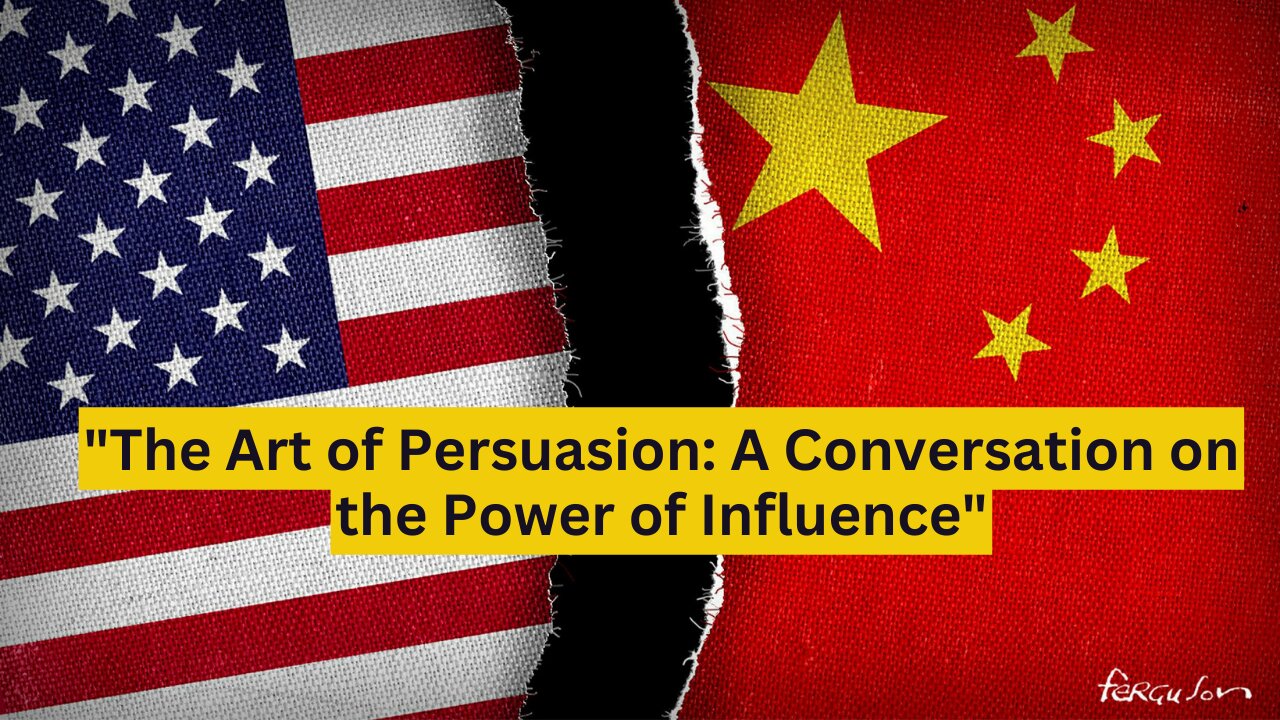Premium Only Content

"The Art of Persuasion: A Conversation on the Power of Influence"
According to a March 2023 survey conducted by Pew Research Center, 83% of American adults continue to hold negative views of China. Moreover, the number of respondents holding "very unfavorable views" of China has increased by 4 percentage points since last year to reach 44%. Approximately 40% of Americans also describe China as an enemy of the United States, rather than a competitor or a partner, an increase of 13 points since last year. Concerns have been raised about China's role in the world, especially regarding geopolitical and human rights issues. While Americans view China's technological power as a lower concern than these other issues, many are aware that TikTok's parent company is located in China, and by a more than two-to-one margin, more Americans support than oppose the U.S. government banning TikTok. The survey also revealed that Republicans and Republican-leaning independents view China's role in the world more negatively than Democrats and Democratic-leaning individuals. However, younger Americans and people with higher levels of education tend to be more open to the possibility of collaboration with China than older and less-educated Americans. Other notable findings from the survey show that Americans are divided on their views of China's economic power. Just over half of Americans (51%) see China as the world's leading economic power, while 44% still see the U.S. as holding that position. This is a significant shift from just a few years ago, when the majority of Americans saw the U.S. as the world's leading economic power. In addition, Americans are split on the issue of whether China's economic growth is good for the U.S. economy, with 44% saying it is and 46% saying it is not.
Furthermore, the survey found that Americans are concerned about China's impact on American jobs. Over half of Americans (53%) believe that China is responsible for job losses in the U.S., while only 13% believe that China has created jobs in the U.S. These concerns are likely to contribute to the negative views of China held by many Americans.
Overall, the survey shows that Americans continue to have negative views of China, with concerns ranging from China's geopolitical role in the world to its policies on human rights and its impact on the U.S. economy. While there are some areas where Americans are open to cooperation with China, such as student exchanges and trade, there is generally a high level of skepticism about the possibility of working with China on key issues. These negative views are largely driven by political party affiliation, with Republicans and Republican-leaning independents being more negative towards China than Democrats and Democratic-leaning independents.
The survey results also highlight the importance of education and age in shaping attitudes towards China. While those with higher levels of education tend to have more negative views of China overall, they are also more open to working with China on some key issues. Similarly, younger Americans tend to be more positive towards China and more willing to prioritize multilateralism.
In conclusion, the survey conducted by Pew Research Center highlights the complex and often negative views that Americans hold towards China. While there are some areas where Americans are open to cooperation with China, such as trade and economic policy, there is a high level of skepticism about the possibility of working with China on key issues. These negative views are largely driven by political party affiliation, with Republicans being more negative towards China than Democrats. The survey also highlights the importance of education and age in shaping attitudes towards China, with higher levels of education and younger age groups being more positive towards China overall.
In addition to these primary roles, the kidneys also play important roles in maintaining electrolyte balance, regulating blood pressure, producing hormones, and supporting the production of red blood cells.
There are several different conditions and diseases that can affect the kidneys and their ability to function properly. Some common examples include kidney stones, urinary tract infections, glomerulonephritis, and chronic kidney disease. Treatment options for these conditions can vary depending on the specific underlying cause, but may include medications, lifestyle changes, or surgery in more severe cases. Subscribe for more content like this.
It is important to take care of your kidneys through healthy habits such as staying hydrated, eating a balanced diet, and avoiding excessive alcohol and tobacco use. Regular check-ups with a healthcare provider can also help detect any potential kidney issues early on and prevent complications down the line. "Older Americans Continue to Hold Negative Views of China While Younger Adults Show Nuanced Criticality: A Look at the Latest Pew Research Findings"
When it comes to views of China, there is a clear generational divide among Americans. According to the latest Pew Research findings, 91% of those ages 65 and older hold an unfavorable opinion of China, compared to 75% of those aged 18 to 29. While older Americans’ negative feelings toward China have remained largely unchanged in recent years, younger adults have turned slightly more negative over the past two years.
However, the findings also highlight the nuanced, critical views that younger Americans have when it comes to China. Despite holding relatively warmer views than older people, younger adults are also more aware of China's economic strength and see the country as the "world's factory." They worry about possible threats posed by China, both militarily and in terms of cybersecurity, and see the U.S. and China as locked in a competition on the world stage.
The study also shows a clear political divide in how Americans view China, with Republicans and independents who lean toward the Republican Party more likely to hold an unfavorable opinion of China than Democrats and Democratic-leaning independents. The findings also indicate that Americans with a college degree or higher education are more likely to have an unfavorable opinion of China than those with some college or less.
Americans are more likely to see China as a competitor than an enemy or partner, with 52% describing China as a competitor, a 10 percentage point drop from a year ago. However, the share describing China as an enemy has increased 13 points, from 25% in March 2022 to 38%. Democrats are significantly more likely than Republicans to categorize China as a competitor, while the prevailing view among Republicans is that China is an enemy of the U.S.
The study also delves into how Americans perceive China's international intentions, with the majority critical of how China interacts with other countries. Eight-in-ten say China does not contribute much to peace and stability around the world, and three-quarters of U.S. adults say China interferes in the affairs of other countries. A greater share of Republicans sees China as interfering at least a fair amount in the affairs of other countries than Democrats do, but significant divisions within parties are present.
Overall, the Pew Research findings highlight the complexities of American attitudes toward China. While older Americans continue to hold negative views of China, younger adults show more nuanced criticality, and there is a clear political divide in how Americans view the country's international intentions. Thanks for watching, subscribe our channel for authenticity.
-
 LIVE
LIVE
Wendy Bell Radio
4 hours agoAmerica Is Done Being The World's B*tch
6,792 watching -
 1:27:21
1:27:21
JULIE GREEN MINISTRIES
2 hours agoLIVE WITH JULIE
57.3K97 -
 1:27:41
1:27:41
Game On!
13 hours ago $3.95 earnedA Tradition Unlike Any Other with Paige Spiranac! Master 2025 Preview!
11.4K3 -
 18:28
18:28
World2Briggs
19 hours ago $6.29 earnedTop 10 Cities That Are Held Together with Duct Tape
16.5K24 -
 17:50
17:50
Degenerate Jay
12 hours ago $5.08 earnedGoodbye Val Kilmer - Batman, Forever
20.3K12 -
 18:16
18:16
IsaacButterfield
1 day ago $3.12 earnedThe Police Were Called!
20.9K8 -
 8:57
8:57
Hannah Barron
22 hours agoBass Fishing from a Paddleboard!
27.3K25 -
 8:34
8:34
The Rich Dad Channel
12 hours agoIf You're an Employee You're Running Out of Time, Watch This Before It’s Too Late
19.2K -
 31:31
31:31
Uncommon Sense In Current Times
17 hours ago $1.90 earnedHow This War in Israel Was Prophesied | Joel Chernoff
28.7K6 -
 55:12
55:12
Esports Awards
15 hours agoBarney Banks on Esports, TikTok Fame, Dancing & More | Origins Podcast #1
26.8K1